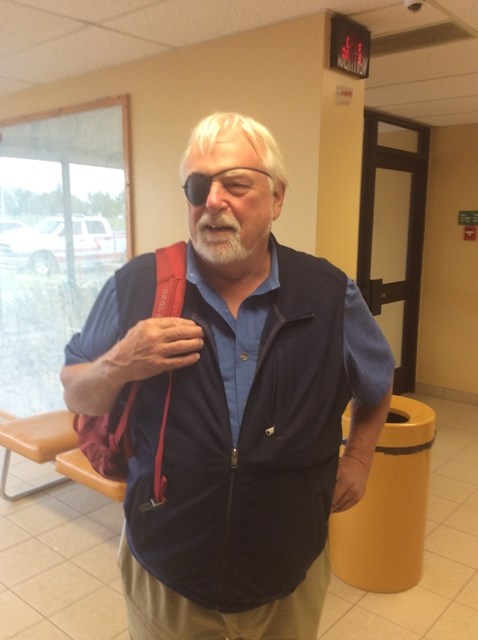A leading expert in oil spill cleanup was in North Battleford to meet with civic officials Sunday.
Dr. Ed Owens, of Owens Coastal Consultants, was with officials from city administration at the North Battleford airport to update them on the shoreline cleanup operations that were ongoing. He was called in by Husky to deal with the spill of oil into the North Saskatchewan River following a pipeline breach in July.
Owens has provided consulting and technical expertise on oil spills around the world. His experience includes the BP spill in the Gulf of Mexico and the Exxon-Valdez spill in Alaska.
In speaking to reporters Sunday, Owens indicated that his initial focus at the moment was simply on assessing how to deal with the spill.
"I've been looking at the river, brought in a team of oil observers who've been along the riverbanks and affected area, mapping what's there so we can decide what are the best ways of cleaning up the shorelines of the river," said Owens.
Owens had been in Prince Albert the day before, where he said he met with the Mayor and city manager and other officials to discuss the same concerns.
"Severity is always a function of the risks, and here we have people whose day to day life has been affected by the spill," said Owens.
"It's not the size of the spill that matters as much sometimes as the effect it has on the people in the area. So the level of effort that gets put forward is clearly high when you have this sort of situation."
As for the oil itself in this situation, it is one Owens say he is familiar with in past cleanups.
"The oil is a typical local oil, we've actually in the past had to deal with many similar types of oil in different situations -- these heavier oils that get a bit sticky when they get onto the shorelines and the riverbanks."
The plan is for a phased approach to the cleanup. The first phase is "looking for those areas where oil is easily remobilized and then directing operations into those areas. We want to get control of this spill, and so where there is mobile oil, and there is still some in the riverbanks just downstream, we want to control that first and then we'll get on with the longer term second phase job which is actually removing that oil from the shorelines -- that oil that poses a risk."
As for the timeline, Owens said it was hard to say, but did say it was "definitely weeks" as opposed to a matter of days.
One of their strategies, he says, depends on the weather; they are looking at reaching some targets for oil removal before having to demobilize as winter comes along.
In Prince Albert, Owens was interviewed by CBC News and mentioned that oil would degrade and break down naturally -- which created quite a bit of social media comment. In North Battleford, Owens elaborated some more about it.
"Oil basically breaks down naturally," said Owens. "Every spill eventually breaks down. It's just -- what is an acceptable time frame, and any time you've got people involved in nearby, one of our key roles is to accelerate the natural recovery, get the system back the way it was before the spill as quick as possible, but without doing additional damage from our operations. So we know the oil is going to break down, it's not going to break down in a time frame that is acceptable because there are human issues here."
His strategy is to take away the bulk oil, and then the "small residues that may be left afterwards will be broken down by natural biodegradation and other natural processes. And that's typically what happens in every spill situation."
As for whether the river will ever get back to the way it was before the spill, Owens said it would.
"Oh, yes, it will eventually get back to normal. The time question is very important."
The plan for the cleanup is to work right through until the winter, and then plan for the spring after the snow melts and the ice is broken up.
"The plan is to remove the oil as much as possible before then so it poses no risk, and then with the energy that's associated with the spring breakup processes, then we'll be back resurveying, resembling, looking at the whole situation again to determine if there is a need at that time for any further work."
Meeting with Dr. Owens was an important agenda item for city officials on Sunday, but Tuesday promised to be even busier.
A special council meeting has been called for Tuesday at 12 noon at city hall. Among the items to be discussed at that meeting is the recent agreement by the town of Battleford to supply water to the city, as well as developing other sustainable water sources for the city.




